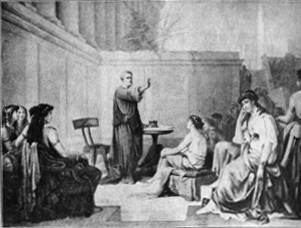Brief
Philosophy overview:
Part 0: Whose knowledge gets to count as "philosophy"?
A. Anthropological typology
of societies
| Type: | Band society | Tribal Society | State Society |
| Politics: | Consensus ("acephalous") | "Big Man" or cheif | Representational government |
| Economics: | Gatherer-hunter | Horitcultural/pastoralist | Agriculture/industralist |
| Family: | Nuclear | Extended | Nuclear |
| Religion: | Monotheism | Polytheism | Monotheism |
B. Typology
of knowledge systems for comparison between different societies:
1. Western: USA, Europe (and "westernized" societies).
2. Non-western state: Typically historical studies of Chinese, Hindu, Muslim,
ancient Egypt empires.
3. Indigenous: often tribal or band societies, i.e. the folks who got colonized.
4. Vernacular: peasants, "street smarts."
Ghanian philosopher Kwasi Wiredu: "folk wisdom" of indigneous or vernacular cultures lacks "critical analysis" and "rigorous arguement" to count as true philosophy on its own, but we can bring it into philosophic discussion.
"Ethnophilosophy"
(eg Placide Tempels, E. J. Alagoa) takes the opposite view.
I. Rationalists:
logic provides the unshakable grounds for Truth
A. Presocratic philosophers:
1. The standard story is that philosophy begins in ancient Greece, but profound systems of abstract thought about the fundamental principles of existence are found everywhere (e.g. India’s Vedic tradition).
2. Within Greece, the Pythagoreans began a philosophy based on math, in particular the idea that whole number ratios represent an underlying harmonics of the universe (the “music of the spheres”). Pictured here is Pythagoras speaking to his student Theano, often regarded as “the first woman philosopher.”
3. The discovery of irrational
numbers like sqrt 2, which could not be expressed as whole number ratios (probably
first discovered through an attempt to analyze the diagonals of a pentagon)
was extremely disturbing.

B.Socrates/Plato:
our world is flux, but ultimate Truth is in god's static realm of Forms
1. Political implications: Plato concludes that philosopher-king is preferable to democracy, but not clear that is a result of rationalism (empiricism could also be basis for authoritarian conclusions, as we will see in Shapin and Schaffer).
2. Politics of gender, body, and nature: Merchant and others draw ecofeminist conclusions (critique of dualist thought, etc.).
3. For contemporary discussions, greatest implications in idea of pre-existing reality, typically objects of mathematics. Did circles and triangles exist before people existed? Did the Mandelbrot set?
C.Rene Descartes
(1596-1650): sensory experience can mislead, but logic (via God) can provide
Truth
1. Method of radical skepticism, attempted to show how it can build foundation of absolute certainty (starting with Cogito Ergo Sum).
2. Phrase "Cartesian" in philosophy often refers to mind/body split, and again seen as key in the politics of gender, body, and nature by Merchant and other ecofeminists. But it is in some ways an unfair accusation: Descartes specifically claimed that his method of skeptical rationalism is available to both men and women (also evidenced in his extensive correspondence with Princess Elizabeth of Bohemia, and Queen Kristina of Sweden).
II. Empiricists:
sensory experience provides the unshakable grounds for Truth
A.
Francis Bacon
(1561-1626): Hearsay evidence
is untrustworthy. Experiments let you see for yourself.
B.
David Hume (1711-1776): we never experience
causality, only the putative cause and its effect – it is merely circumstantial
evidence, based on habit (i.e. we infer that the basic physics of the world
will continue as it has been).
III. Empiricism
and Rationalism Meet:
A. Kant (1724-1804): universal truths possible because of the universal operations of the conscious mind.
1. Distinction between synthetic (new) and analytic (tautological) knowledge; "proved" existence of synthetic apriori (new knowledge prior to perception); ie showed that mathematics is both certain and synthetic, and that causal relations can also be placed in this realm, thus true science is possible (contra Hume).
2. Distinction between phenomena and nounema: our mental "categories" only give us knowledge of appearances, or phenomena, and not things-in-themselves ("nounema").
3. The certainty offered by his system is disturbed, if not destroyed, by the rise of non-Euclidean geometries.
B. Positivism
1. The term is from
August Compt (writing in 1856)): says empiricism + rationalism = objective
truth, i.e. science.
2. Shapin and Schaffer’s
“Leviathan and the Air-Pump” describes how the clash between empiricism
and rationalism was resolved in the conflict between Hobbes and Boyle. This
became the inspiration for Latour’s concepts of the illusory “constitution”
which divides human as agentic and non-humans as non-agentic. It also inspired
Haraway’s title “Modest Witness,” as we will read later
in the course.
3. The Nihilists (not!) -- Sophia Kovalevsky – in contrast to Compt’s totalitarian implications, these young rebels saw science as potentially anti-authoritarian.
4. Reactions against positivism?: Relativism
1.
Cultural relativism:
a method used by anthropologists to see the world from another societies’
view.
2.
Moral relativism
(killing people for sport is OK for individuals for which that is the ethical
norm).
3.
Epistemological relativism
(2+2 = 5 if someone believes it).
Historicism
(“Of course now we’d call that sexist, but it was acceptable for its time…”)
eg Hegel
Linguistic
relativism (Sapir-Whorf hypothesis, Wittgenstein)
on to philosophy overview part II